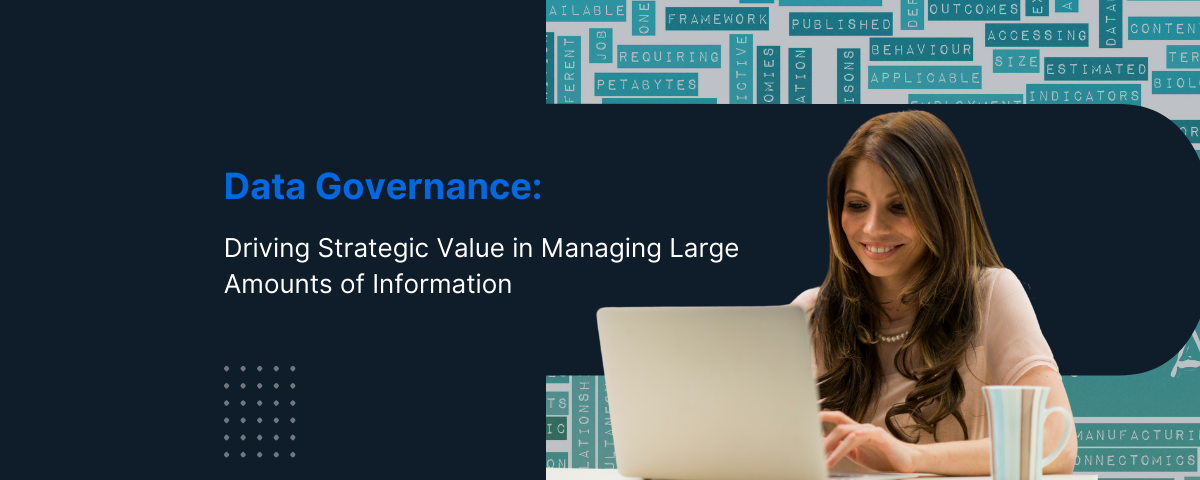
Staff Augmentation vs. Direct Hiring
July 22, 2024
The Power of Big Data and Artificial Intelligence in Business Transformation
August 28, 2024Driving Strategic Value in Big Data Management
Today, data is critical to the success and competitiveness of organizations. Companies that manage large amounts of information must adopt effective data governance practices to maximize the strategic value of their data and avoid significant risks. Data Governance not only ensures the quality and accessibility of information, but also prepares organizations for future technological innovations.
Main Data Governance Guidelines
- Designation of a Data Officer: The first step in Data Governance is to designate a responsible person within the organization. This individual or team will be responsible for overseeing data management, ensuring data integrity and consistency. The figure of the Chief Data Officer (CDO) has become crucial in many companies, acting as the guarantor that internal policies and external regulations are properly complied with.
- Data Quality Definition and Management: Data quality is essential to its usefulness and reliability. Establishing clear quality standards and managing them consistently throughout the data lifecycle is critical. This includes data validation, cleansing, and continuous enrichment to ensure that information is accurate, complete, and consistent.
- Compliance with Internal Policies and External Regulations: Regulations such as GDPR (General Data Protection Regulation) and HIPAA (Health Insurance Portability and Accountability Act) impose strict requirements on how personal data must be handled. Organizations must ensure that their data handling practices comply with these regulations to avoid penalties and protect the privacy and security of information.

- Data Lifecycle Management: The data lifecycle spans from creation and storage to use and disposal. Effective lifecycle management ensures that data is accessible and useful when needed and securely disposed of when no longer needed, minimizing the risks of data breaches.

Benefits of Data Governance
- Informed Decision Making: With high-quality, well-managed data, companies can make more informed and strategic decisions. For example, a retail company that analyzes sales and customer behavior data can optimize its inventory and marketing campaigns, resulting in increased sales and customer satisfaction.
- Risk Mitigation: Data Governance helps identify and mitigate risks associated with managing large volumes of data. This includes protection against data loss, unauthorized access and regulatory compliance.
- Operational Efficiency: Effective data management improves operational efficiency by reducing redundancy and ensuring that information is available when and where it is needed. For example, a logistics company that uses real-time data to manage its supply chain can reduce warehousing costs and improve delivery times.
- Data Culture: Implementing strong Data Governance fosters a data-centric organizational culture, where all decisions are based on accurate and up-to-date information. This drives innovation and continuous growth.
Risks and Losses from Lack of Data Governance
- Misinformed Decisions: Without proper data management, business decisions can be based on inaccurate or incomplete information, which can lead to negative outcomes and missed opportunities. For example, a financial firm that does not have accurate credit risk data can suffer significant losses due to poor lending decisions.
- Increased Costs: Lack of control over data can result in unnecessary expenses, such as additional storage costs, incorrect data handling, and losses from operational inefficiencies. For example, a manufacturing company that does not properly manage its data can incur high production costs due to inventory errors.
- Security and Compliance Risks: Poor data management increases vulnerability to security breaches and regulatory sanctions, which can affect the company's reputation and financial stability.
- Loss of Trust: Customers and partners may lose confidence in an organization that does not properly manage their data, which can affect business relationships and competitiveness in the marketplace.

Conclusion
Data Governance is essential for any enterprise that handles large amounts of information. Through the implementation of structured and effective practices, organizations can maximize the value of their data, improve decision making and mitigate risks. In an increasingly digital and competitive business environment, adopting a robust approach to Data Governance is not just an option, but a strategic necessity.
If you want to take your enterprise data management to the next level, at iPPb Global we offer customized Data Governance solutions to help you maximize the value of your information assets. Contact us today to start your journey towards more efficient and strategic data management!



